Josh Rushing's Blog, page 31
September 5, 2012
Just a heads up, if you want feedback (re: post regarding newest ep) you should enable replies on your posts. Not seen the most recent one, but all round fault lines is an amazing series, congrats to you and all the others making it happen
Thanks! I didn’t realize I hadn’t done that. So now people who have been following me for at least two weeks can reply. That seemed to be the most open option.
September 4, 2012
Here’s my latest Fault Lines episode. Enjoy. And let me...
Here’s my latest Fault Lines episode. Enjoy. And let me know what you think…
The US’ housing bubble burst nearly six years ago, but the worst may be yet to come.
After a landmark settlement, the major banks have lifted a freeze on foreclosures and government relief has been too small to make a difference.
“We are often portrayed as the bad people, like we basically just come in and make all the money from people who are in bad situations. But the fact is, if we don’t buy the property then the bank [will] take the property back.”
- Amy Chen, a real estate investor
Public housing budgets have been slashed, leaving larger numbers of people with no place to call home.
The line between home ownership and homelessness is growing ever more blurry, but neither President Barack Obama nor Mitt Romney have made housing a major campaign issue.
Meanwhile, popular anger is rising over the perceived impunity of the banks and some have found innovative ways of fighting back in an age of austerity.
Fault Lines travels to Chicago and California to see how people at the frontlines of the crisis are confronting the collapse of the American dream.
“If you ask people who have been foreclosed upon, whose fault is it? They often they say it’s mine. It’s my fault, I did the wrong thing, instead of kind of saying this is a systemic problem,” explains David Harvey, a social theorist and a professor of anthropology at the Graduate Center of the City University of New York.
“Capital is always producing surpluses, at the end of the day if you have got a profit, you’ve got a surplus and the big question is what do you do with it.
“[So] what you do is that you take part of that surplus and you reinvest it in something. And in United States, housing and urbanisation in general has been a vast field for expansion of profitable opportunities.”
August 18, 2012
joshrushing:
Check out my first day hosting The Stream! Turns...
Check out my first day hosting The Stream! Turns out I didn’t totally screw it up (always an option on live TV) and it was a hell of a lot of fun! Let me know what you think…
August 17, 2012
Check out my first day hosting The Stream! Turns out I...
Check out my first day hosting The Stream! Turns out I didn’t totally screw it up (always an option on live TV) and it was a hell of a lot of fun! Let me know what you think…
August 15, 2012
My favorite blogger (that's why I married her)...
For a behind-the-scenes peek into my life, check out my wife’s hysterical blog: paigerushing.tumblr.com. It’s how I keep up with what’s happening in my home…
August 14, 2012
The streets of Chile are erupting again with student protests....
The streets of Chile are erupting again with student protests. For a deeper look into what’s behind their anger check out my Fault Lines episode about it (see above).

Alfredo Vilma. High School Student Leader. (Photo by Josh Rushing)
For more of my photos from Chile click here.
August 13, 2012
Inches Apart, Worlds Away. (photo by Josh Rushing)
There’s...
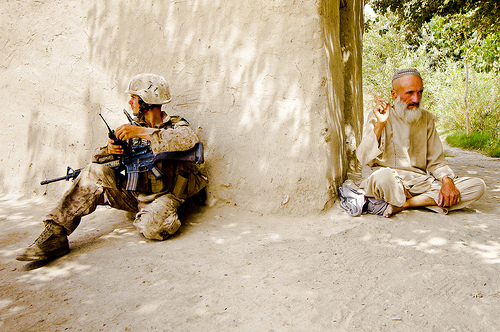
Inches Apart, Worlds Away. (photo by Josh Rushing)
There’s a great collection of photos on Foreign Policy from Afghanistan in the 1950s. The pictures are from Rajiv Chandrasekaran’s book: Little America: The War Within the War for Afghanistan. The FP website describes the photo collection as, “Photos from a time when tiki bars and afternoons at the pool dominated the lives of Americans in Afghanistan.”
They reminded me of my last trip to Helmand Province, Afghanistan, in 2009. I embedded with the US Marines in what was one of the more miserable trips of my life. The heat was often near 130 degrees Fahrenheit and there was no electricity. We were sleeping in the dirt outside because the buildings continued to radiate heat like large clay ovens in the night. We were supposed to drink two dozen bottles of water a day that were also 130 degrees. It was like sipping coffee without the coffee when you already felt like you were on fire.
The only respite from the brutal conditions was a well that had been put in by US AID in the 1950s. My crew and I avoided the well at first for fear of bacteria or amoeba, but before long we were soaking our burned skins and dry throats in its cold flow. I’ll never forget that well and how such a small thing can make such big difference in one’s quality of life.
I’ll also never forget the base at Kandahar. We passed through it for only a matter of hours, but it seemed so telling about the US’s mission in Afghanistan. Rajiv’s title hits it on the head: Little America.
Here’s an excerpt from my observations there:
…We find out we are scheduled to depart on a military flight in the middle of the night. They need something to do with us for the next 10 hours. A master sergeant offers to take us to the social area of base. As we are driving across the enormous base, he gives us directions on how to get back to the dining facility for our evening rendezvous. We round a corner and he says, “Just remember when you get to the French cafe, take a left”. Clearly they don’t fight wars like they use to.
We drive past a coffee and doughnut shop, a Canadian hockey rink (sans ice) and a gym. Sand like talcum powder fills the air as does the sharp odor of boiling urine and baking feces from ubiquitous port-o-johns. Inside one such plastic stall, graffiti refers to the smell as “the persistent poop aroma”.
We go into the base store to pick up local SIM cards for our cell phones. Inside, soldiers in various uniforms from different NATO member countries shop for their war-time essentials, which by the look of the merchandise includes plenty of body building supplements and teddy bears, knives and flat-screen televisions.
We need to escape the heat, so we head to the computer lounge. They will not allow us in because we have bags. There is a rule, which we find out is another thing this base has plenty of, that says “no bags”. We go to an entertainment and recreation building. We hear it is air conditioned. This time it is a double whammy, another rule - “no open-toe shoes”. I am in flip flops, my other shoes are in a bag the Marines stored for us. Our cell phones do not work, although it matters little because the number we are given for the Marines can only be dialed from another military phone. Finally we find such a phone and eventually our contact comes for us. We put our bags in his room and he gives me his running shoes to wear for the day.
So far the “hell” part of “War is hell” seems completely self-imposed by uniformed bureaucrats, adult-hall monitors intent on ensuring soldiers wear ridiculous glow-in-the-dark belts as they walk around base and wash their hands before every meal. Perhaps, “War is kindergarten,” would be a more appropriate cliché, on this base at least.
In the MWR tent I sit on a leather couch that is so hot it puts the seat heaters in my car to shame. We have escaped the sun, but not the heat. I sweat profusely while writing “I sweat profusely”. Hundreds of soldiers watch TV, play pool and ping pong. A special area is set aside for what seems to be the most popular pastime. Two dozen black leather couches lie end-to-end facing flat screen TVs each hooked to a video gaming system. With real machine guns resting at their boots they play first-person shooter games. While not on real patrols they are on virtual patrols killing countless virtual bad guys and winning in contests where the idea of victory is clear and where there are no consequences for losing….
For the rest of the blog and more photos: click here.
August 10, 2012
I'm hosting The Stream on Al Jazeera English

Okay, just for one day, this Thursday (8/16): I’m taking a spin in The Stream’s anchor chair. I’m a huge fan of the show and its crew, so it will be tons of fun. Join the experience by sending me show ideas. Free range thinking is encouraged and all ideas will be considered. Fault Lines fans don’t fret, I’m still down with FL. In fact I’m flying out to Asia soon to film an episode for next season.
Sincerely,
Your friendly TV guy, Josh
Btw, as a side note, I’m sitting on Paige’s gift for my 40th birthday: 1972 FJ40 Toyota Land Cruiser. Pretty cool, huh?
August 9, 2012
Back on the Euphemism Treadmill: Thoughts on having offended
I recently tweeted about a man in Texas who was executed after a board-certified expert concluded he had mental retardation. Marvin Wilson’s case drew criticism because in 2002 the US Supreme Court ruled it unconstitutional to execute a mentally retarded inmate. For the sake of 140 characters I dropped the word “mentally” in front of “retarded” and sent out the following tweet:
“Texas to kill retarded man. For view from inside death chamber check out my report: Anatomy of an American Execution http://t.co/QyXk9DJB”
When this tweet appeared on my Facebook timeline, a friend informed me that my use of the word “retarded” is offensive. I was disappointed to hear this. In a world of the privileged and the dispossessed, I try to stand with the latter. I’ve never worried about pleasing everyone—a sure recipe for failure—but at the same time, I’m not in the habit of offending those with disabilities, intellectual or otherwise, or their loved ones.
I’m happy to strike the word “retarded” from my everyday vocabulary; however in this particular instance, use of the word was very important, perhaps even a matter of life or death.
In the Supreme Court case Atkins v. Virginia the highest court in the land ruled, “Those mentally retarded persons who meet the law’s requirements for criminal responsibility should be tried and punished when they commit crimes. Because of their disabilities in areas of reasoning, judgment, and control of their impulses, however, they do not act with the level of moral culpability that characterizes the most serious adult criminal conduct.” To execute them would deny their eighth amendment protection from cruel and unusual punishment.
The Supreme Court used the phrase mentally retarded in its decision. In my tweet I parroted this phrase but dropped the word “mentally”, perhaps it’s less offensive with the qualifier. Yet later in the third section of the decision the justices write, “To the extent there is serious disagreement about the execution of mentally retarded offenders, it is in determining which offenders are in fact retarded.”
The Supreme Court left it to the states to set their own standard for who is considered mentally retarded. And this is where language becomes more than semantics.
Many news stories about Wilson’s execution edited the Supreme Court’s dated language, changing the phrase “mentally retarded” to “mentally impaired “ or “intellectually challenged”. In doing so, these well-meaning journalists also changed the facts.
Had Texas courts declared Wilson sufficiently mentally retarded, he would still be alive today. On the other hand, the State could have admitted that Wilson was intellectually challenged and still have executed him. The phrase “intellectually challenged” is never mentioned in the Atkins decision, nor does it appear in the 2004 Texas judge’s opinion that sets the State’s standard for determining if an inmate qualifies for consideration under Atkins (citing a definition from the American Association of Mental Retardation, which in a real sign of the times has since changed its name to the American Association of Intellectual Developmental Disabilities, even though it can still be found at www.aamr.org). Low intelligence is only one of the three criteria that Texas requires to be considered mentally retarded. A lack of adaptive behavior skills and the manifestation of these disabilities prior to the 18th birthday are the other two.
Stepping away from the legalities involved, Wikipedia offers, “The terms mental retardation and mentally retarded were invented in the middle of the 20th century to replace the previous set of terms, which were deemed to have become offensive.”
The language considered appropriate to use in the description of sensitive situations is ever-evolving. Harvard psychologist and linguist Steven Pinker describes this process as the euphemism treadmill. Mentally retarded has been shuffled off the treadmill and into the offensive pile, meanwhile intellectually disabled holds the current spot of appropriateness. Soon it too may find its way into the same bin of offense, replaced by another temporary phrase.
Supreme Court decisions in this regard are temporally challenged, forever stuck in time and the language of their day.
I hope for a time when we no longer need this debate, a cause that could be made all the easier, if states would stop executing people with intellectual disabilities and the Atkins decision can become an obsolete relic of history.
In the meantime the euphemism treadmill will grind on. I doubt we will ever be comfortable with any phrase used to describe conditions that we wish we would never have to describe in the first place.
This discussion reminds me of a similar adverse reaction I had a few nights ago while watching the Olympics. I was awestruck by the 400m qualifying race. South African Oscar Pistorius ran it in 46.54 seconds, even though he is a double amputee who wears prosthetics on both legs. Afterward the NBC reporter asked him what it was like to run with “able-bodied” athletes. Oscar handled the question with grace and humility, but I winced. If Oscar Pistorius is not “abled-bodied” then I can only imagine the euphemism that could be applied to me dragging myself across the finish line long after him. And no matter how much time I spend on the treadmill, euphemistic or otherwise, could change that.
August 7, 2012
ANATOMY OF AN AMERICAN EXECUTION
Texas is set to execute Marvin...
ANATOMY OF AN AMERICAN EXECUTION
Texas is set to execute Marvin Wilson tonight. Wilson was convicted nearly twenty years ago of killing a police informant. The case has raised questions because even though Wilson has an IQ that reportedly places him in the bottom percentile of the nation, Texas has declared him mentally competent enough to kill him.
Wilson will die by lethal injection. I witnessed an similar execution in Oklahoma earlier this year. Above is the news piece I filed about the execution. I wasn’t allowed to take a camera into the death chamber, so here’s what I witnessed:
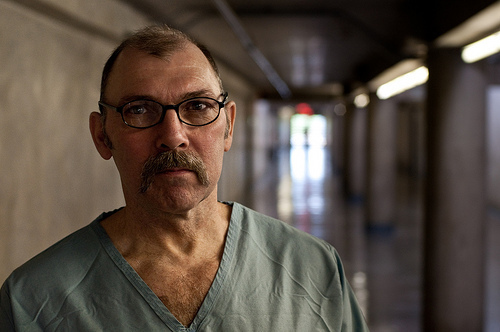
Michael Selsor executed May 1, 2012, in Oklahoma.
May 1, 2012 — I came to Oklahoma to witness a killing, a homicide in fact.
At a microphone Debbie Huggins fights tears and with a strong southern drawl says slowly, emphatically: “What we did to him today was much kinder than what he did to my dad.”
“Him” refers to Michael Selsor and “what” to the murder of Clayton Chandler, a clerk shot six times during a gas station robbery in Tulsa, Oklahoma. Selsor pulled the trigger even after Chandler had complied and volunteered the loot.
“In 1975 I never would have thought that it would take 37 years for justice,” Huggins says.
Today’s justice was delivered about half an hour before Huggins approached the microphone; it is why I am here.
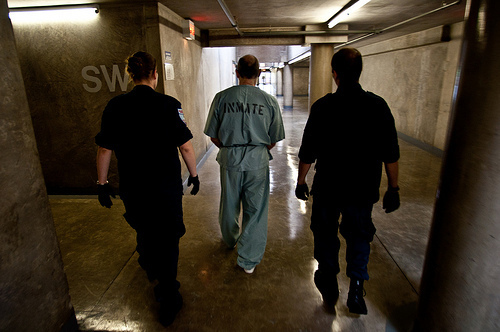
Michael Selsor walking. [Josh Rushing]
There are few acts graver than when a government takes the life of one of its own citizens. Executions often get a lot of coverage in the US, when there is something controversial about the case or enough people believe the condemned might be innocent. These scenarios attract media attention and fuel vigils. This was not the case with Michael Selsor. Everyone agreed that he did it, including him. The reporters who cover Selsor’s execution will focus on Huggins and her family. Perhaps you cannot blame them. The only interview Selsor ever granted was to me.
Even though executions are conducted on behalf of the citizens of the state, very few are allowed to witness it: families of the condemned and their victims, lawyers, law enforcement, and journalists. This is why I felt a responsibility to witness Selsor’s end and then to report it as dispassionately and honestly as I could. The following attempts such an account.
About an hour before Huggins gives her statement, I am led from a makeshift media center to the notorious H Unit, home of Oklahoma’s death row. A pat down ensures our escorts that I carry no possessions other than the clothes on my back. They give me paper and a pen so I can take notes. I am joined by five other reporters. We maneuver through a set of gates that open to a large passageway. The walls and floor are made of smooth concrete. The passage feels stark, modern, like a secret missile silo - and incongruous with this century-old prison famous for inmate rodeos and executions.
Eventually we turn through a large yellow door into the death chamber’s viewing room. I have been here before, but then the space was empty and part of the tour - now it is ready for business.
A handful of prison officials and guards are waiting for us in the viewing room, a narrow rectangle about four times as long as it is wide. A long series of windows to my right are covered by drawn blinds. Two rows of 12 brown metal folding chairs - the kind dragged out of a storage closet at a school picnic - are lined up. I am the first reporter in the room and told to go to the end of the second row and take a seat.
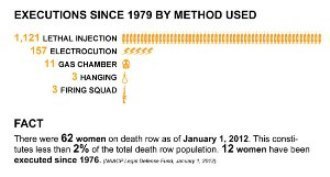
As I sidestep down the row I notice for the first time another set of windows on the left side of the room. The tinted panes conceal the identity of those on the other side. I suppose the setup is not unlike a wedding with two families to attend to and keep separated. The original victim, Clayton Chandler, is represented by an unknown number of family members behind the dark glass. It is hot in this room - at least 90 degrees and rising as people file in. Movement behind the opaque windows catches the light and my eye; at least two people are fanning themselves with white paper. Chandler’s family members must already be in place, watching us nervously find our seats.
Three lawyers in dark suits representing Selsor enter next and sit directly in front of me. Selsor’s family follows. His son wears a grey t-shirt, shorts and a military-short haircut. Tattoos cover his neck and arms. Selsor’s sister, with a shock of blonde hair, looks tired. Her bright blue, short-sleeved shirt contrasts a suntanned face, wizened beyond her years. A box of cheap tissues rests in the son’s chair, courtesy of the state. Once Selsor’s family is settled, a small contingent of law enforcement file in, including Jeff Jordan, who investigated Chandler’s murder as a rookie homicide detective. He is now Tulsa’s police chief.
A cacophony of banging echoes throughout the prison. We have been warned not to be alarmed by the noise - it is how inmates say their goodbyes.
Selsor is respected on death row. He is seemingly regarded as a serious and contemplative individual who became an asset of sorts to prison inmates and staff alike - though officials always caveat the sentiment with a reminder that his crime was inexcusably wrong and such actions must bear consequences. As the run guy, a job given to the toughest of the condemned, Selsor made deliveries to other cells and kept fellow inmates in line. When school children visited the prison, Selsor played a regular part in the tour. From behind bars he shared with the children his life lesson about the consequences of one’s actions.
The appointed time nears and the banging becomes rhythmic - quick at first, but slowing now to a steady, dirge-like pace.
The director of Oklahoma prisons, Justin Jones, who has twice appeared on Fault Lines, enters. The yellow door shuts behind him. Rather than taking a chair, he is handed a phone, a hotline to the governor’s office. Though not far from me, I cannot hear what he is saying. Jones hangs the receiver up, picks up a different phone connected with the execution chamber and tells them to proceed.
It is exactly 6 pm local time. The curtain goes up as guards raise the mini-blinds inside the execution chamber. Selsor’s family in front of me gasps at the sight of him. He is strapped to the bed with his arms padlocked down and covered in a sheet up to his chest. Selsor’s pinched eyebrows convey a look between fear and guilt.
The son waves to his father for what turns out to be the last time and reaches for the tissues. The son and sister begin to cry. Selsor lifts his head as much as he can and turns toward his small audience: “My son, my sister, I love you ‘til I see you again next time. Be good. Eric, [Selsor’s lawyer] keep up the struggle.” His eyes scan the viewing room: “I’ll be waiting at the gates of heaven for you. I hope the rest of you make it there as well.”

There have been at least 1,121 executions by lethal injection in the US since 1979 [Josh Rushing]
He turns his head toward the prison official standing over him and says: “I’m ready.” Relaxing back to the bed, he turns his head to the side and focuses on his son.
Though we cannot see it, we all know what is happening now. Two intravenous lines run from Selsor’s arms to two holes in a wall about three feet behind his head. From a hidden room, three executioners each press a plunger sending lethal doses into his veins: one with pentobarbital, another with vecuronium bromide and a third with potassium chloride. The executioners are each paid $300 in cash, so no paper trail leads to their identity.
With a tilted head still looking at his son, Selsor’s gaze begins to fade, his eyelids half closing. A final breath exits his body with a visible puff from his lips. His body stills, eyes half open and locked on his son. It is roughly 6:03 pm.
The next three minutes pass painfully slowly. No one moves in the death chamber or viewing room. I hear barely perceptible sounds of crying from the row in front of me. A medical examiner in the chamber approaches the bed, checks for signs of life and pronounces Michael Selsor dead at 6:06 pm.
We solemnly return to the media center. Huggins holds a press conference and tells us that the execution did not bring closure or the kind of justice it seems she was seeking, but it is easy to see her relief from the death of Selsor. The ultimate boogeyman in her mind was finally gone.
In time a death certificate will be issued from the state of Oklahoma. For cause of death, it will say Selsor died from a homicide. Though it took nearly four decades to find its target, it is clear now that the trigger Selsor pulled that fateful day in 1975 ended not only Chandler’s life, but his own as well.
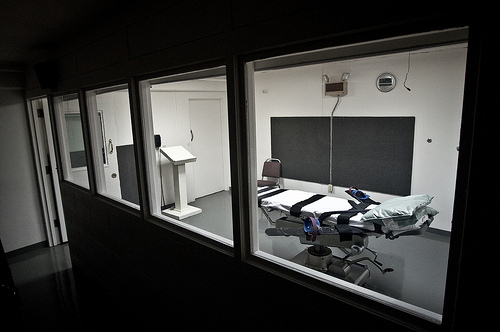
Oklahoma Death Chamber [Josh Rushing]
—————————————————————————————————
Michael Selsor’s only interview:
MIKE SELSOR, DEATH ROW INMATE
May 7, 2010
My name is Mike Selsor, my number is 91854 and I’m serving a first degree murder sentence.
How long have you been on death row?
This time here since ‘98.
What do you mean this time?
This is my second time on death row. I first came in here in February 1976 and went to death row then. And back then the Supreme Court ruled Oklahoma’s death penalty unconstitutional and that’s how I got off of it. And through the years I’ve kinda kept up my appeals and eventually won a retrial. Went back for a retrial and got a good ol’ rural Oklahoma screwin’ from the courts, and I’m back on death row again.
For the same crime?
For the same crime.
What’d you do?
Murder. Person got killed and I’m to blame for it.
What are your thoughts on the death penalty?
I’m actually against it. I don’t think a government - whether it’s capitalist, socialist or communist - should have this kind of power over its subjects. This is making the government a demagogue or a God status, to have the power of life and death over an individual. Whereas I think a government’s function is to upraise mankind, not downtrodding, you know?
So would you philosophically agree with the government being able to sentence you to life without parole?
Me personally, no. The only difference between death and life without parole is one you kill me now, the other one you kill me later. There’s not even a shred of hope. There’s no need to even try to muster up a seed of hope because you’re just gonna die of old age in here.
Which would you rather have?
With the death penalty sentence I’m entitled to more appeals - the government’s gonna pay for it. I don’t have to do it myself if I don’t have the money for a lawyer which I don’t have. Instead I’m relying on public defenders to do my appeals.
Appeals and stuff aside, would you rather serve a death penalty sentence or a life without parole sentence?
I think I’d rather have the death sentence. And I say this because I’ve already did 35 years in here, and I can’t see doing another 35 and just die of old age. And the way the prison is, I’m kinda blessed and fortunate and lucky to have made it this far, but let’s face it, eventually, I’m gonna get older and weaker, and it’s gonna be hard to fight these battles - whether they be physical, mental, whichever.
What’s the hardest part about being in prison?
There ain’t nothin’ easy about it. Everything is kinda hard. You’re separated from society - which is what prison is for, you were took away from society for a crime, that’s a fact - but growin’ up in this prison I’ve been through two prison riots. Believe me, you don’t come out good on that.
Were you a dangerous guy before prison?
I wasn’t a real nice guy, I’ll say that. All through school I was not quite the bully in the sense that I tormented people but I fought all through school, I’ve gotten kicked out of school for fighting several times, numerous times actually. My dad taught me how to fight pretty good. He used to whoop my ass quite a bit. Ten years old we put boxing gloves on and every Friday night we got it on out in the front yard, and I took me an ass-whoopin ‘til I got big enough and strong enough to whoop his ass.
Do you think you’re a dangerous guy now?
I hope I’m not. I hope that I’ve evolved spiritually and mentally enough that I’m not, but let’s face it, I’m in a rat-hole prison in the worst conditions, and if somebody was to try to put some hands on me I’m gonna hurt em - pure plain and simple - and I’m gonna hurt em bad.
When are you scheduled for execution?
I don’t have a date yet, I still got a couple more appeals to go. But to look at realistically and truthfully, let’s say nothin’ happens on my appeals. I got a little bit of hope that it will. I’ve done used up all my state appeals, and so I got two more federal appeals, which means I’ll be here for this Christmas, but next Christmas might be kinda shaky.
One of the victims daughters went to the DA when they found out I was getting a retrial and brought a lawyer up here with em and protested and all this before I even got up there for a retrial. And that’s where they just steamed up and said aw hell, we’ll just give him the death penalty again.
Have you ever tried to reach out to the victim’s family?
No. Not like tryin’ to contact ‘em directly or indirectly, no. I figure there ain’t nothing I could say to ‘em that would apologise for what I’ve done.
Are you remorseful about it?
Shit, I’ve been remorseful for a long time, not just about that but about a lotta things. Plenty of time to contemplate and reflect on all the things you’ve done in your life, and every one of them deserves remorse. Eventually it’s gonna creep in, depression’s gonna creep in, all that’s gonna take effect.
And really if I could say look I’m sorry for what I’ve done, I’m sorry I killed your dad, what the hell would that mean to her? It’s not gonna make her feel any better, especially if she wants me dead.
Do you think your death might offer her some healing?
No. My death is not gonna change nothin’. Not just in her case but in every case. If you stop and think about it, the trauma that I put their family through, now they kill me, so now my family’s gonna go through the same trauma that they went through, so how does that equal out? In the long run I don’t think it’s going to.
What about a sense of justice - a life for a life?
It’d be like saying ‘a black eye for a black eye’ - everytime you do somethin’ wrong you oughta get a black eye. Hell the whole world would have black eyes.
What if the situation were reversed? Would you seek the death penalty against someone who killed your father or your son?
No. Don’t deprive me. I’d wanna kill ‘em myself. You kill my father, hell I’d wanna kill you myself, I wouldn’t want the state to do it. You go on death row, they got some people up here I see ‘em everyday, that I guarantee some of them crimes that they done if that had been my child, I’d wanna kill him before the police ever saw him. Don’t deprive me.
What do you think of the government?
At some point the government intrudes a little bit too much. The government is supposed to help bring society to a higher level, but at some point the government got so big that it’s took on a life of it’s own, and tryin’ to sustain its own self by whatever means.
Is the government serving society by keeping you away from society?
If I got right out here and somebody killed my child it wouldn’t be I guess, but eventually I’m gonna get so old and feeble that ain’t gonna be able to hurt a rag doll. So how’s that servin’ society?
What about the politicians? Tough on crime, etc?
They’re not accomplishing as much as they could be with the same amount of funds. Ninety per cent of the people in here, drugs or alcohol is behind it somehow. So what if you took somebody that’s come in with a drug deal instead of givin’ him a felony and lockin’ him up for 10 years, why don’t you take him to that Narcanon and get the guy some help instead of being a total burden on society?
If you oppose the death sentence and you oppose life without parole, what would be a just sentence for someone who commits murder?
You gotta do some time, let’s face it, you done a serious and the worst crime possible here, in anybody’s point of view. So you gotta pay. But somewhere along the road there should be some kinda redemption.
Either train the guy after he done so much time, teach him somethin’ where he can get out there and maybe start payin’ his taxes …. You’re not gonna get rich, you’re not gonna be totally poor, but at least you could function and pay back somehow.
I came in here 21 years old, and if I live to be another 30 years, look at all these years I been nothin’ but a total burden on society. No redemption in that.
There’s no sense of hope or growth or evolution is there?
You try to hope there is. You have to have a shred of a little bit of hope that someday you may get out, you know, a little light at the end of the tunnel. Even if it’s a candle 50 miles down the road lit up, you know? Even in my case where really there probably isn’t, I always keep a little shred of hope there sayin’ someday maybe I will get out - on the high side of social security maybe - but I could see the outside world again.
What do you imagine about the outside world? What do you miss?
It’s not in the city, I guarantee you that. I been crammed in here around these men for so long that I don’t want no part of this. I want a river out there within a quarter mile of my house - and I don’t want a big house, I just want a little old shack out there - and if there’s nobody livin’ within 25 miles of me that’d be just fine. I could spend my time fishin’ on that river, maybe trap a few squirrels and rabbits and deer during the winter time, and basically just want to get away from it, you know? I couldn’t imagine goin’ from here to some five-storey apartment building in the middle of the city and have to hear all that noise, that’s what I wanna get away from.
So it’s not the connection with humanity that you miss?
You’re well connected with humanity bein’ in here. You’re just not seein’ the best of it.
What do you think goes into the governor’s decision to grant clemency or not? What’s affecting his decision in your mind?
I really don’t know, I could only take a guess at what he’s thinkin’. I would say he’s analysin’ or calculatin’ it somehow. If I let this guy off, what kind of threat would he be down the line?
How much do you think the decision is politics and what people will think about him letting someone off?
Probably more than what they would admit to. If he’s runnin’ for re-election, I wouldn’t see him grantin’ no clemencies. You see all these politicians rattlin’ off right now - Arizona passed this real strict immigration bill, and now hell, we want one too - to show that we’re tough on crime. Like the politician runnin’ for re-election in Sand Springs up there, he’s wantin’ to make it capital punishment now for child molestin’, even though the Supreme Court ruled that unconstitutional last year, he said that don’t matter, I’m doin’ it anyway, just to show that he’s tough on crime, knowin’ this law ain’t gonna go nowhere. And the people are dumb enough to believe it I guess.
What do you think about death? Do believe in an afterlife?
Well there’s got to be a heaven because I’m livin’ in hell right now.
You’re always reminded of death in here …. you’re constantly reminded just cause you’re on death row. You may think about it a little more often when there’s an execution coming up, so that brings it to the forefront of your mind a little more.
Have you thought about how you’ll handle yours?
Yes I have. For one, I wouldn’t even ask for clemency. I’ve pretty much decided I’m gonna skip that, I ain’t even gonna ask for it. I’m not gonna beg ‘em to spare my life. I’ll try to keep my head up with a little bit of dignity, and I’m gonna be buried out on Periwood Hill. Even if somebody wanted my body, I’d say hell no, I’ve been in this prison my whole life, and that’s where I’m gonna go.
Last meal?
A fried rabbit, that’s what I actually want.
Good luck with that.
I’m talkin’ about a wild one. you know, go out and shoot one, a cotton tail - fry it up with mash potatoes, gravy and corn on the cob.
If there’s a heaven do you think you’ll go there?
I hope I’ve passed the test.
As it says in Christianity - ask for forgiveness. I’ve done that. And I’ve had to do that in a sense from years ago when I realised that all this hate that I had in me from my childhood and on, that this is gonna kill me more than anything else. It’s what I do or what somebody else does, this is what’s gonna kill me. If I didn’t release it and learn how to release it than sure I was gonna go to hell.
Do you think that with different parents and different circumstances, you would’ve ended up in a different place?
No. It would have to be a different me. I don’t wanna blame my parents for my shortcomings. It would have to be a change in me. I would have to look at things different from the way I looked at ‘em.
Josh Rushing's Blog
- Josh Rushing's profile
- 3 followers



